Weltweit leiden noch immer über 800 Millionen Menschen an Hunger und Mangelernährung. Dieses Problem hat fatale Folgen für die nachhaltige Entwicklung in vielen Ländern. Student_innen der Universität für Bodenkultur haben sich im Rahmen eines Seminars mit dem Thema befasst.

Kompilation: Laura Hundscheid et al.
Zero Hunger
Do 28. Juli 2022
SDGs und kein Hunger
Die Sustainable Development Goals (SDGs) der UN wurden im Jahr 2015 von 193 Staaten unterzeichnet. Basierend auf der Erkenntnis, dass sich die globalen Herausforderungen unserer Welt nur gemeinsam lösen lassen, wurden insgesamt 17 Ziele formuliert, die eng miteinander verknüpft sind und soziale, ökologische sowie wirtschaftliche Nachhaltigkeitsaspekte gleichermaßen beinhalten. Das „SDG2 - Kein Hunger: Den Hunger beenden, Ernährungssicherheit und eine bessere Ernährung erreichen und eine nachhaltige Landwirtschaft fördern“ beinhaltet die Bekämpfung von Fehlernährung jeder Art und trägt somit zur Realisierung einer gesünderen und nachhaltigeren Ernährung für alle bei. Die Landwirtschaft betreffend fordert das SDG2 die Umsetzung einer nachhaltigeren, resilienten Nahrungsmittelproduktion entlang der gesamten Wertschöpfungskette.
Lehrveranstaltung „Angewandte Entwicklungsforschung I“
Das interdisziplinäre Seminar „Angewandte Entwicklungsforschung I“ ist eine Lehrveranstaltung der Universität für Bodenkultur in Wien. Neben Fallstudien und Beispielen aus aktuellen BOKU-Forschungsprojekten im Globalen Süden veranschaulichten externe Expert_innen aus Verwaltung, Politik und NGOs, wie Forschungen und Projekte in die Praxis umgesetzt werden.
Im letzten Wintersemester entwickelten Studierende mögliche Entwicklungsprojekte, die einen Beitrag zu den UN-Nachhaltigkeitszielen leisten. Ein besonderer Fokus lag dabei auf dem SDG2. Darauf aufbauend und durch einen „Call“ wurden die Studierenden ermutigt, ein eigenes Entwicklungsprojekt zu entwerfen und zu präsentieren. Die Student_innen formierten sich in Kleingruppen und entwickelten schrittweise ihr eigenes Projekt, basierend auf ihren Interessen und dem im Kurs erhaltenen Wissen. Abschließend stellten die Studierenden ihre Projektvorschläge einer interdisziplinären Auswahlkommission vor, zudem erhielten sie die Möglichkeit, ihre Arbeiten im Technischen Museum Wien, begleitend zur Ausstellung FOODPRINTS, zu präsentieren. Aus einer Auswahl wurde das beste Poster ausgezeichnet.
Im Folgenden ein Überblick über die entwickelten Projekte:
TES – Transdisciplinary Education for Sustainable Food Systems. Participatory case studies for solving real world problems in the Western Highlands of Guatemala von Julia Männle und Janna Pfister.
It was a new experience and an iterative learning process to design a project that is on the one hand in line with the expectations of the Appear Call while on the other hand having a sustainable impact on current challenges within the project country. While looking for possible ways to address this variety of issues we discovered the potential of transdisciplinary education and research in order to elaborate long-term and holistic answers to complex problems. However, this issue is still neglected in current university curricula. Additionally inspired by a compulsory transdisciplinary module in our own master’s program, we started to develop our project TES. (Julia Männle)
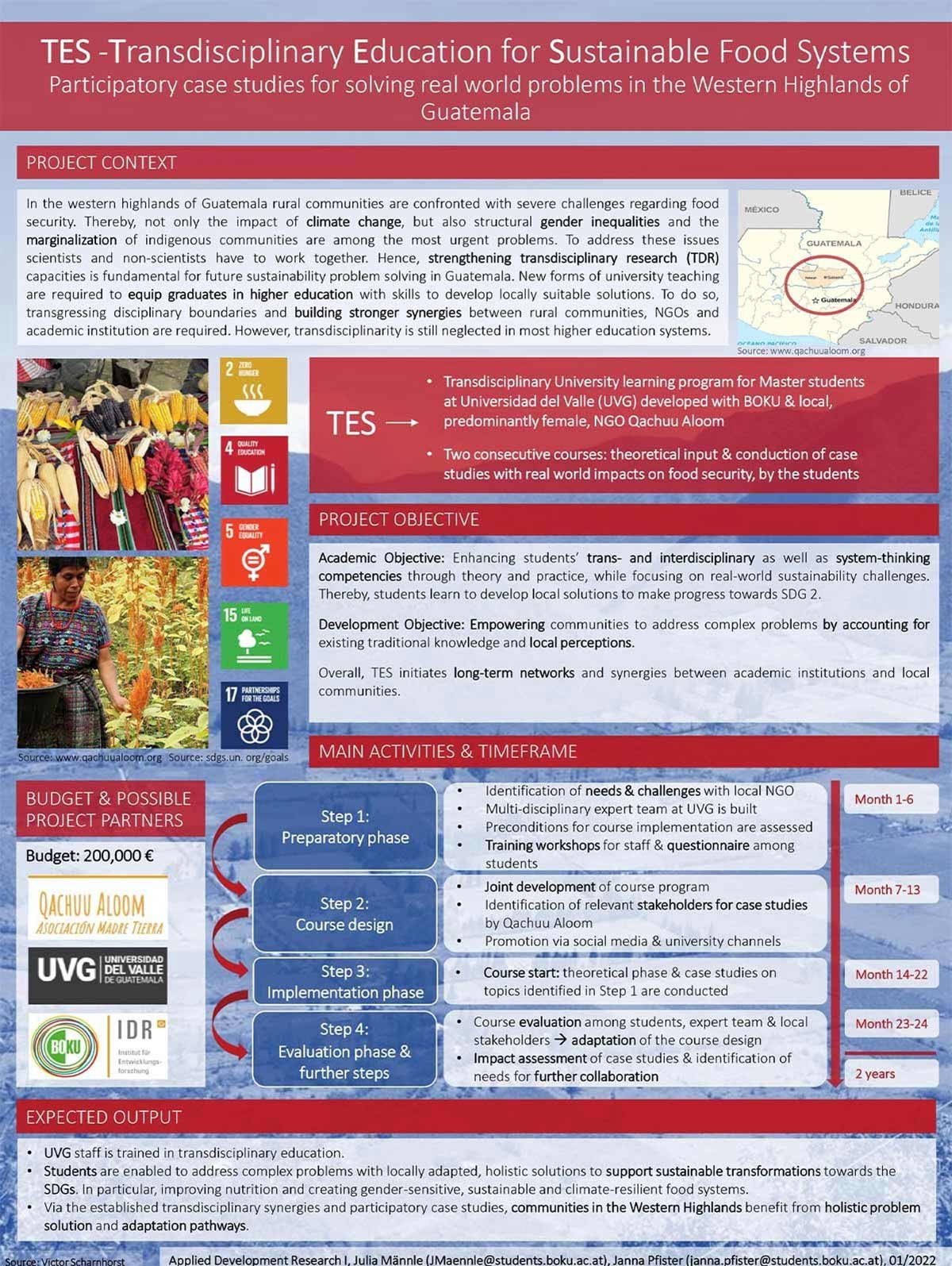
© Männle/Pfister
Re-SESCA: Social and Ecological Resilience for Integrated Coffee Agroforestry Systems von Paulina Vázquez-Quintana, Ayhan Yener, Luis Spinnarke.
Our project aims to address challenges related to coffee cultivation and poverty in Chiapas, Mexico. Our motivation is grounded in the idea of supporting farmers and rural livelihoods in one of the poorest regions in Mexico while protecting regional biodiversity. One of the key challenges was determining the problems of local coffee farmers in order to find community-driven solutions. We addressed this challenge by conducting interviews with the local farmers, which enabled us to form connections and design the project collaboratively. Through developing this project, we gained practical understanding of the interconnected and transdisciplinary nature of livelihood improvement, demonstrating that cooperation and development require an integrated approach that goes beyond individual SDGs. (Luis Spinnarke)
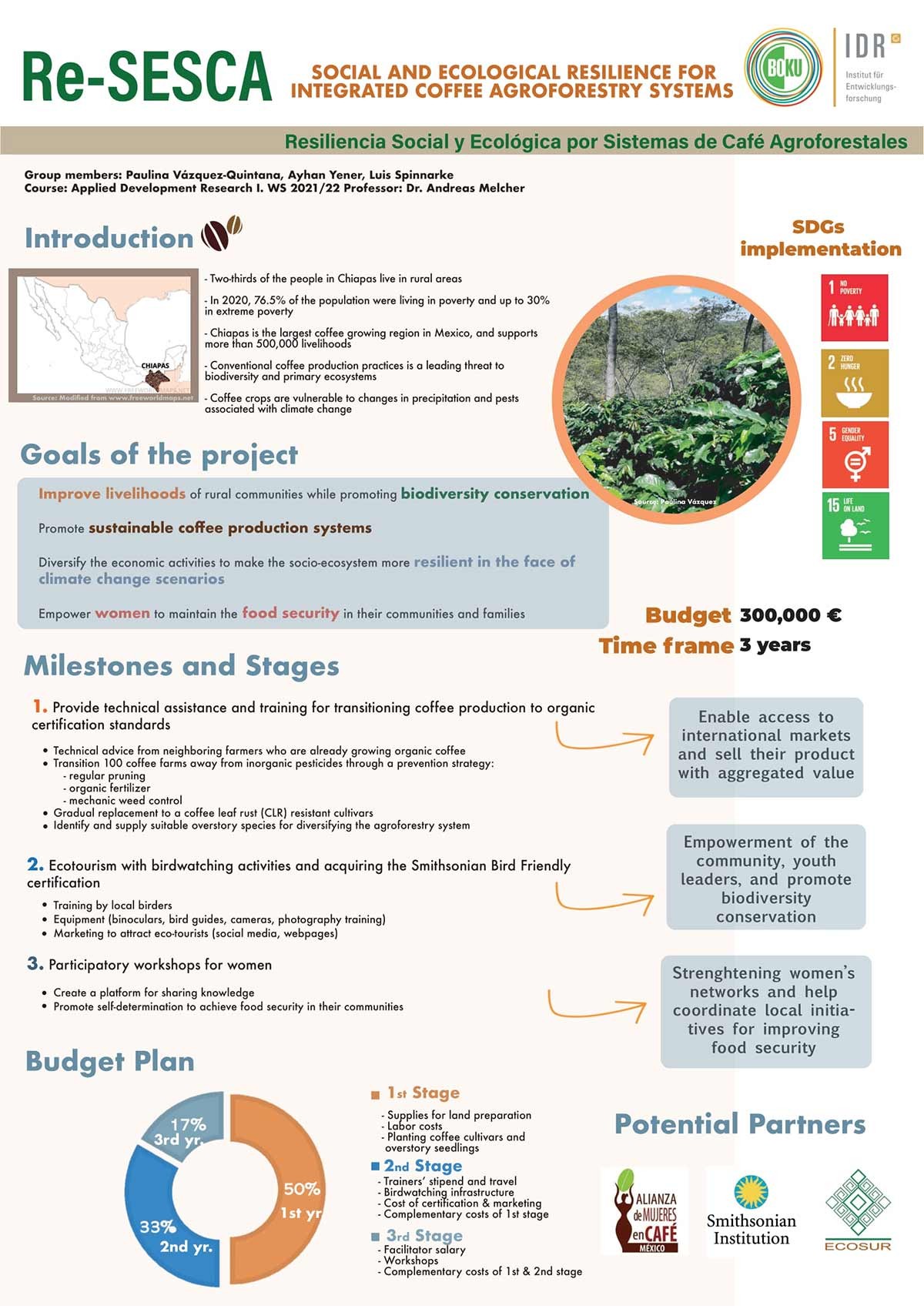
Re-SESCA
© Paulina Vázquez-Quintana/Ayhan Yener/Luis Spinnarke
TIGCHICK - ANIMAL BREEDING FOR FOOD SECURITY IN THE ETHIOPIAN TIGRAY REGION von Abitew Yoseph and Volcic Valerija.
ADR is a lecture that questions not only our perception of the problems in the countries we tend to call “developing” countries but, even more importantly, it critically assesses our methods and our communication about this matter. Personally, the biggest lesson I've learned from this course isn't about SDGs or any other alike overused term these days; I came to realization that our approach and our 'help' in the past did more damage than good. This is why we carry the responsibility to educate ourselves with the help of external experts, and much more necessary, the communities we are trying to work with. A mind shift is needed to change the perspective of 'sending help,' turning it into cooperating and facilitating mutual exchange. (Volcic Valerija)
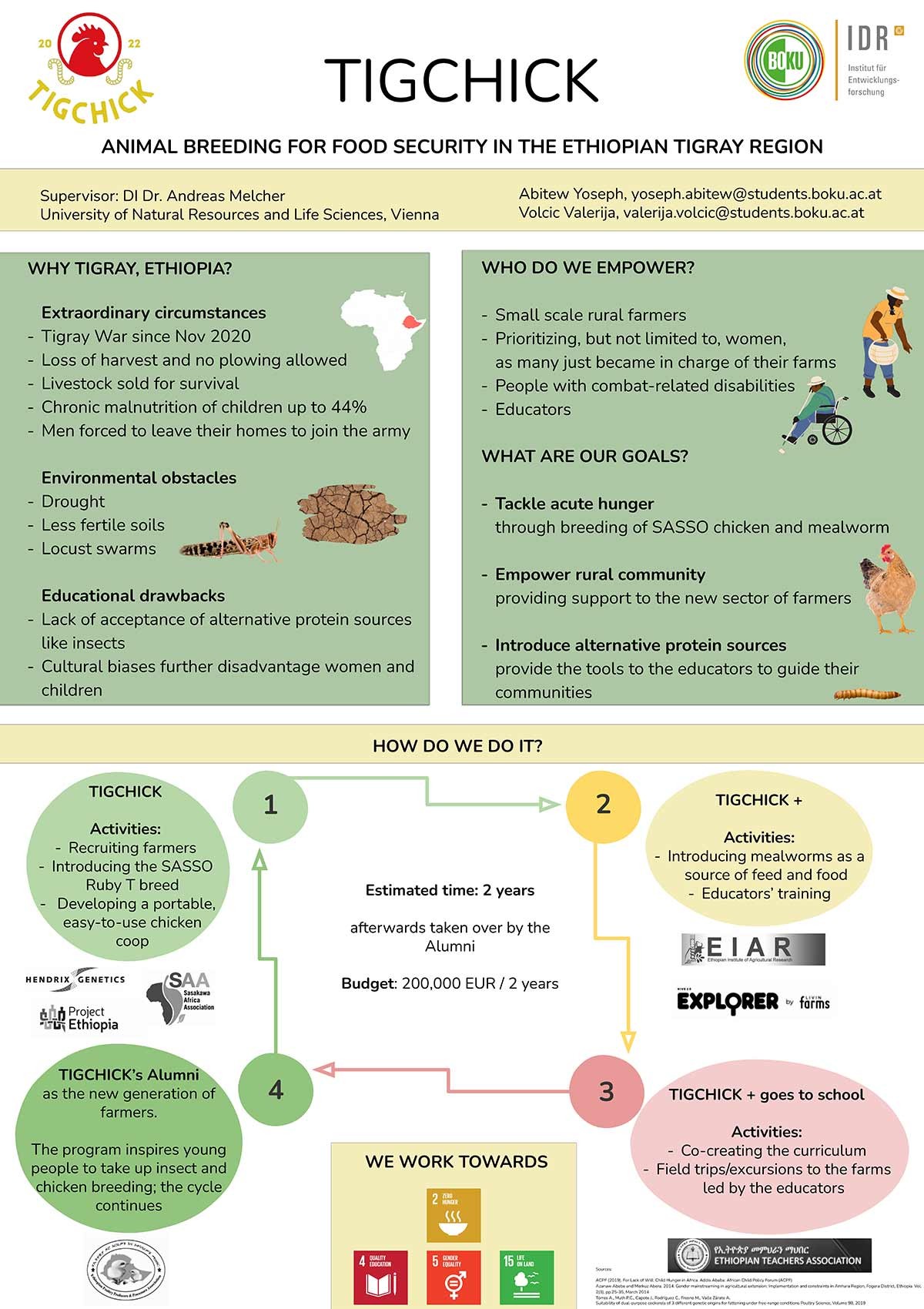
TIGCHICK
© Abitew Yoseph/Volcic Valerija
LocINNO-AFRICA. Towards food security – empowering local innovators in Marshabit/Kenya von Issabelle Ampofo, Florian Schanznig und Gergö Szemes.
ADR has not only opened my eyes to some of the neglected issues regarding gender equality and food security but has also pushed me to think of ways I can help my African continent especially in places where these topics are a major concern. I will never forget the movie “We feed the world” we watched and discussed in class, it’s an eye opener and has made me question our meaning of development, funding, and aid. The course has made me enthusiastic about the future because I want to bring change wherever I find a need. I have never been this passionate about development like I am now after the course. (Issabelle Ampofo)
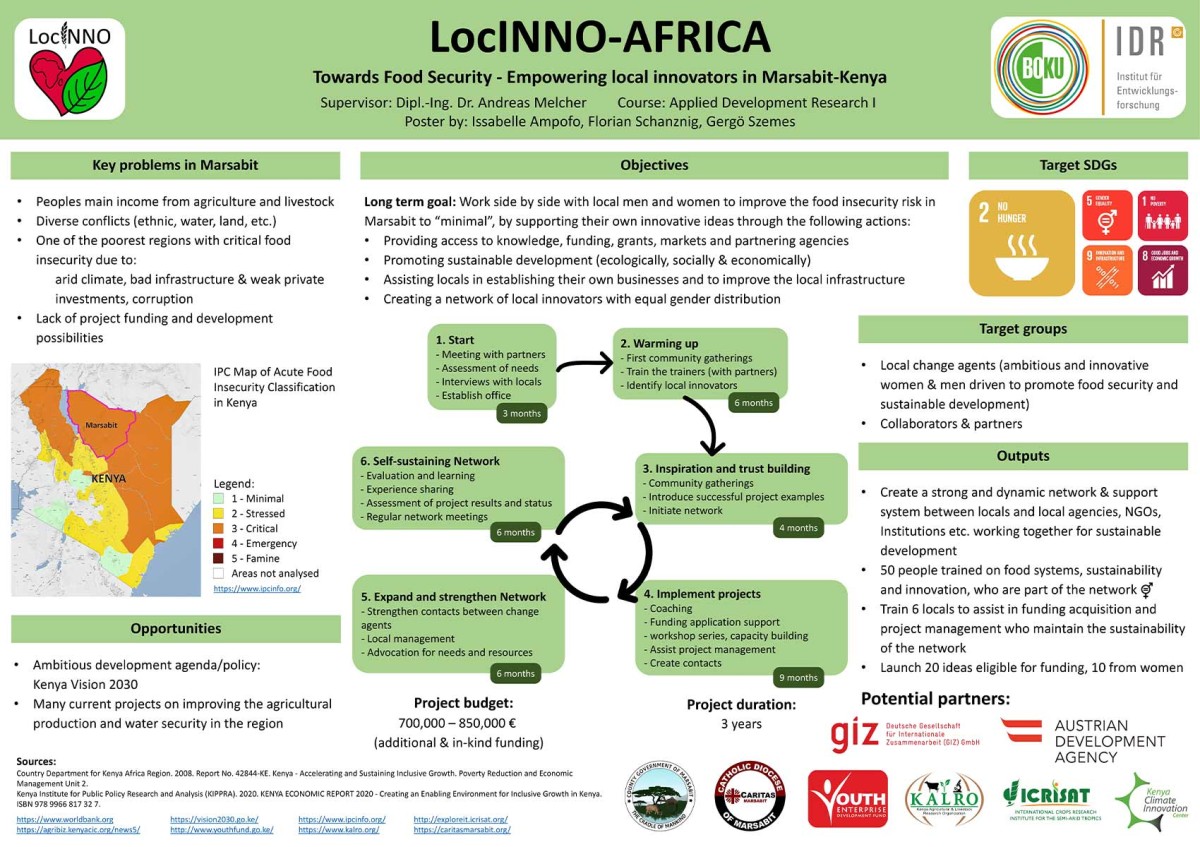
LocINNO
© Issabelle Ampofo/Florian Schanznig/Gergö Szemes
W2W Livestock Network. Connecting Women in Science & Women in Field in Burkina Faso – Region Kampti von Chang Xu und Lisa Reindl.
ADR has introduced us the intentions of development study and provided us with various methods and perspectives we need to consider during development research. I was impressed by the transition from a top-down approach to a demand-driven approach in development projects. It never occurred to me before that development is not just about having the desire and resources to help, but also about forming a self-sustainable system. This is why we choose a demand-driven approach for our project. I have also learned so many things from the gender equality lectures that I wasn't aware before, like how food banks can be a bad thing for the vulnerable groups, how large corporations induced malnutrition among people and the fact we've been ignoring institutional changes regarding women empowering. (Xu Chang)
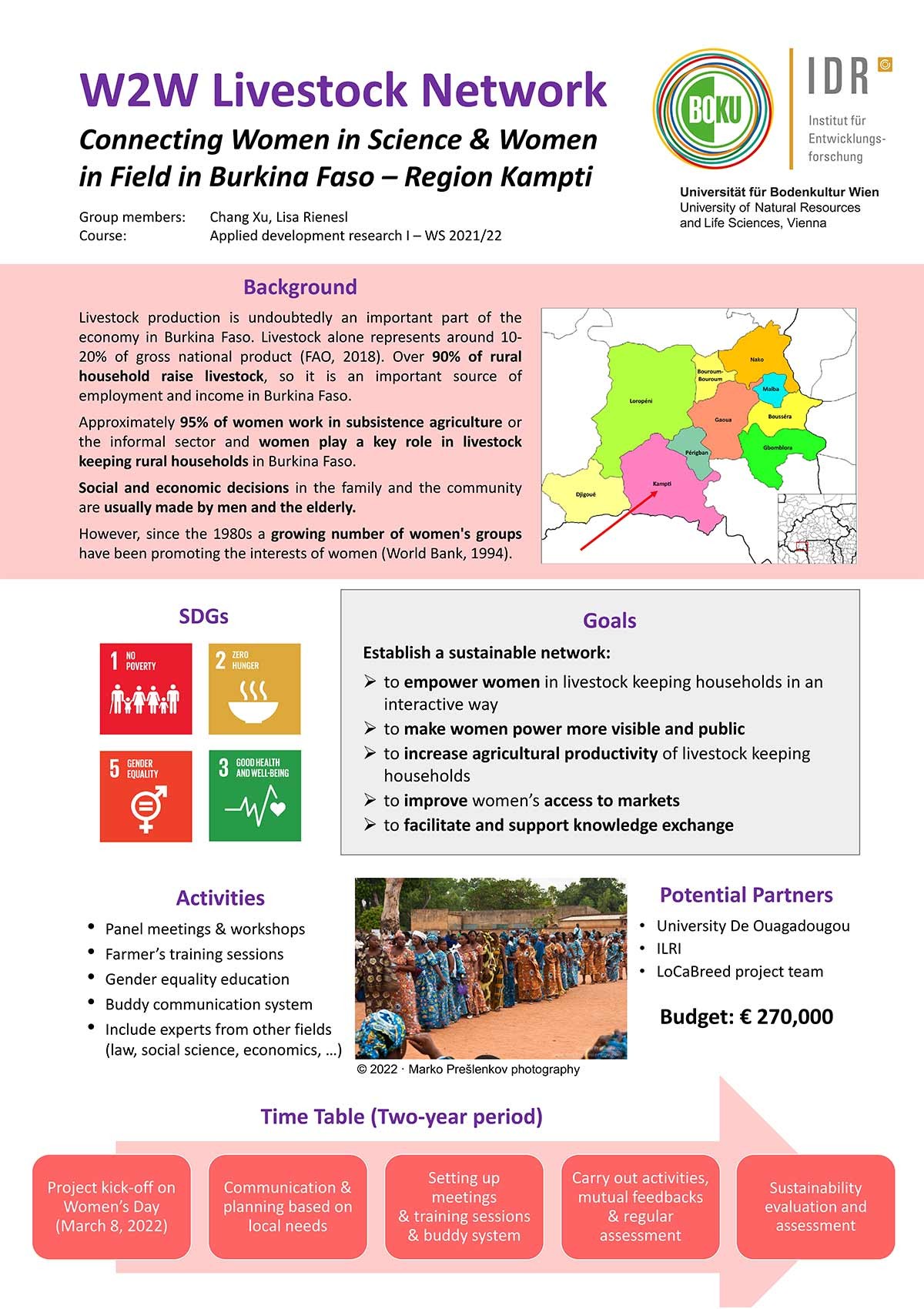
W2W
© Chang Xu/Lisa Reindl
Bees Please – sustainable Honey Production for Biodiversity and regional development in Armenia von Katarzyna Mordaszewska und Gohar Yeghiazaryan.
Participation in the ADR course was a great and eyes opening experience. In the beginning, we were taught about the project complexity and the process itself. Afterward, we have been working on the development of our own project – it allowed us to learn, become more familiar with the challenges and problems around the world, and finally search as well as implement the best solutions. “Bees Please” is a promising project, which aims to educate, lead workshops and set up hives in the Lori region in Armenia. Bees provide a wide range of ecosystem services that contribute to the well-being of people whilst maintaining the planet’s life support systems. We have reviewed the SDGs alongside the potential contributions of bees in achieving individual SDG targets and came to the conclusion that bees are crucial to achieving sustainable development goals. (Katarzyna Mordaszewska)
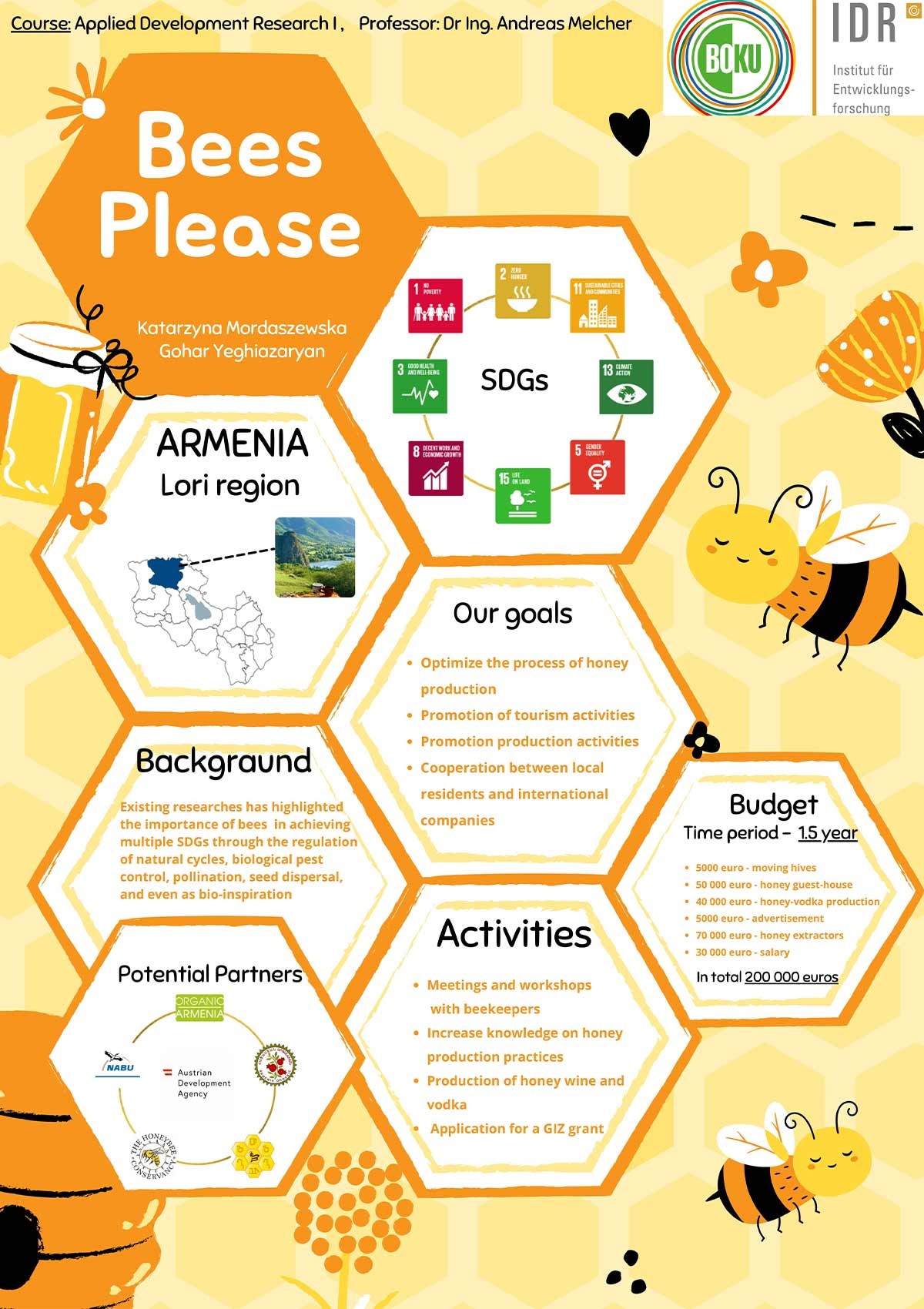
Bees Please
© Katarzyna Mordaszewska/Gohar Yeghiazaryan